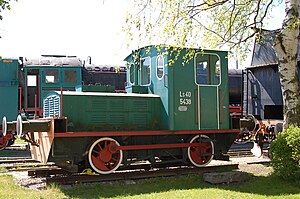PKP class SM02
| SM02/Ls40 | |||||||||||||||||||||||||||||||||
|---|---|---|---|---|---|---|---|---|---|---|---|---|---|---|---|---|---|---|---|---|---|---|---|---|---|---|---|---|---|---|---|---|---|
 Ls40-5438 locomotive in Kościerzyna Railroad Heritage Park | |||||||||||||||||||||||||||||||||
| |||||||||||||||||||||||||||||||||
| |||||||||||||||||||||||||||||||||
| |||||||||||||||||||||||||||||||||
| |||||||||||||||||||||||||||||||||
SM02 (model Ls40) is a Polish series of diesel shunting locomotives used by PKP. 12 of the locomotives were introduced into PKP after 1954.[1] It is the first diesel locomotive of Polish production.[2]
History
[edit]SM02 was finally designed at the beginning of the 1950s and the production started in 1952 in Fablok, Chrzanów. Before 1960 those locomotives were named Lo1xx in PKP, where xx stands for numbers. Those machines did not find much use in PKP, mainly because of poor performance features.
Ls40 locomotives were nonetheless widely used in the industry.[1] During the service S64L engines proved to be insufficient for the tasks of this locomotive, so a few last items had been equipped with more powerful S324HL motors. Meanwhile, several older locomotives had their engines replaced during servicing.
Preservation
[edit]Several items of Ls40 locomotive stay in service in industry, but they are being withdrawn systematically. Ls40-5438 engine serves as an exhibit in Skansen Parowozownia Kościerzyna museum and Ls40-4572 was bought by Polskie Stowarzyszenie Miłośników Kolei (En.: Polish Society of Railway Enthusiasts) from Grodziskie Zakłady Farmaceutyczne "Polfa" in Grodzisk Mazowiecki on 30 June 31995.
Technical data
[edit]SM02 is a B locomotive, which means there are two powered axles under the unit. These axles are not articulated relative to other parts of the locomotive. The locomotive is propelled by a diesel engine and the power was supplied to axles through mechanical transmission.[3]
References
[edit]- ^ a b Jarek D. Stwarz (1997–2002). "Chester Home Page". Retrieved 2007-08-30.
- ^ Piotr Mlak, Grzegorz Kochan (2002). "Rozwój spalinowych pojazdów trakcyjnych w Polsce". Archived from the original on 2007-09-15. Retrieved 2007-08-30.
- ^ "Pod egidą PTMKŻ KMK Olsztyn". Retrieved 2007-08-30.
